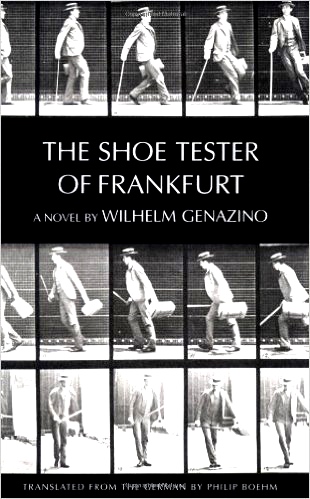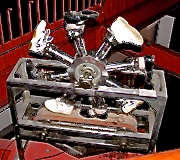Note: This novel was WINNER of the Georg Buchner Prize, the most prestigious book prize in Germany, in 2004. Author Wilhelm Genazino is also WINNER of the Kleist Prize for German Literature in 2007, and the Kassel Literary Prize for Grotesque Humor in 2013. This novel is his only book translated into English.
“I hav e this sensation that people like me should be told to either disappear or else get remodeled like the old buildings. This sensation is connected with another feeling I often have, namely that I’m here in this world without any inner authorization. Strictly speaking, I’m still waiting for someone to ask me whether I really want to be here. I imagine how nice it would be if I could grant myself this permission, let’s say this afternoon.” –Unnamed speaker, as he walks around Frankfurt.
e this sensation that people like me should be told to either disappear or else get remodeled like the old buildings. This sensation is connected with another feeling I often have, namely that I’m here in this world without any inner authorization. Strictly speaking, I’m still waiting for someone to ask me whether I really want to be here. I imagine how nice it would be if I could grant myself this permission, let’s say this afternoon.” –Unnamed speaker, as he walks around Frankfurt.
The Shoe Tester of Frankfurt by German author Wilhelm Genazino begins as an existential investigation by a self-conscious 46-year-old man into who he is and why he behaves as he does. His hypersensitive observations about the world around him show a man who “hardly thinks at all anymore—I only look round and about.” The unnamed speaker has been working for seven years as a “shoe tester,” a man who walks around Frankfurt testing quality shoes for a manufacturer and then reviewing them. The speaker enjoys this job, as his walking gives him unlimited opportunity to muse about his life, observe people from the past with whom he has had relationships, reminisce about their mutual experiences, and contemplate “the collective peculiarity of all life.”
While he walks, he thinks about his childhood, his failed relationship with Lisa, with whom he has lived for several years, and his lack of professional motivation, and the reader observes him as he has an afternoon interlude with his hairdresser, begins a new relationship, meets a friend who is a failed photographer, gets a drastic cut in salary, and begins work as a vendor in a flea market. He believes that universities should offer courses in “Comparative Guilt Studies,” and he often makes ponderous statements, noting that “The only truly important people are the ones who have been able to fuse their individual knowledge with their positions in life,” and “People love when they’re no longer running away…”

From the 1930s to the early 1940s, shoe testing was done with this machine, not by people walking around the city.
All this introspection might become tedious were it not for the fact that the author also highlights the ironies and absurdities of the speaker’s life, which build, until, ironically, at a cocktail party, he spontaneously tells someone that he works for the imaginary Institute for Memory Arts and provides “experience sessions” for clients. His life and his mood begin to change, and when he sees a friend in dire circumstances, which might have mirrored his own, he finally begins to believe that “I no longer have the desire to scrutinize myself. I’m no longer waiting for the outside world to finally fit my inner texts! I’ve stopped being the blind passenger of my own life.” He has reached the end of this phase of his philosophical and psychological journey and has come to new understandings, no longer someone who willfully closes his eyes to the world but one who looks around and begins to recognize his connections with the rest of humanity.
The author’s dry, tongue-in-cheek humor keeps the novel from imploding under its own weight, while the conclusion offers an upbeat future. Slow to start, the novel evolves into a delightful exploration of one man’s memories and his halting steps toward a new life. The author’s offbeat observations of life, his sense of irony, and his witty appreciation of absurdity evolve in the second half of the book, and these qualities ground the speaker’s new understanding of himself in reality and change the mood from melancholy to peaceful acceptance, if not joy. Published by New Directions, which is noted for its publication of experimental fiction and literature from Europe, the novel was translated by Philip Boehm, who manages to preserve subtleties of the speaker’s thoughts while, at the same time, preserving the weirdness of some of the speaker’s observations without his appearing insane or ridiculous. Short, witty, and with something to say, Genazino’s novel is great fun for a summer day.
Photos, in order: The author’s photo appears on http://www.welt.de/
An early shoe tester is found on https://www.exploratorium.edu/
The speaker found a job at the Frankfurt flea market, one of the best in Europe. http://www.frankfurt-tourismus.de/en/Media/Attraktionen/Shopping/Frankfurt-Flea-Market


